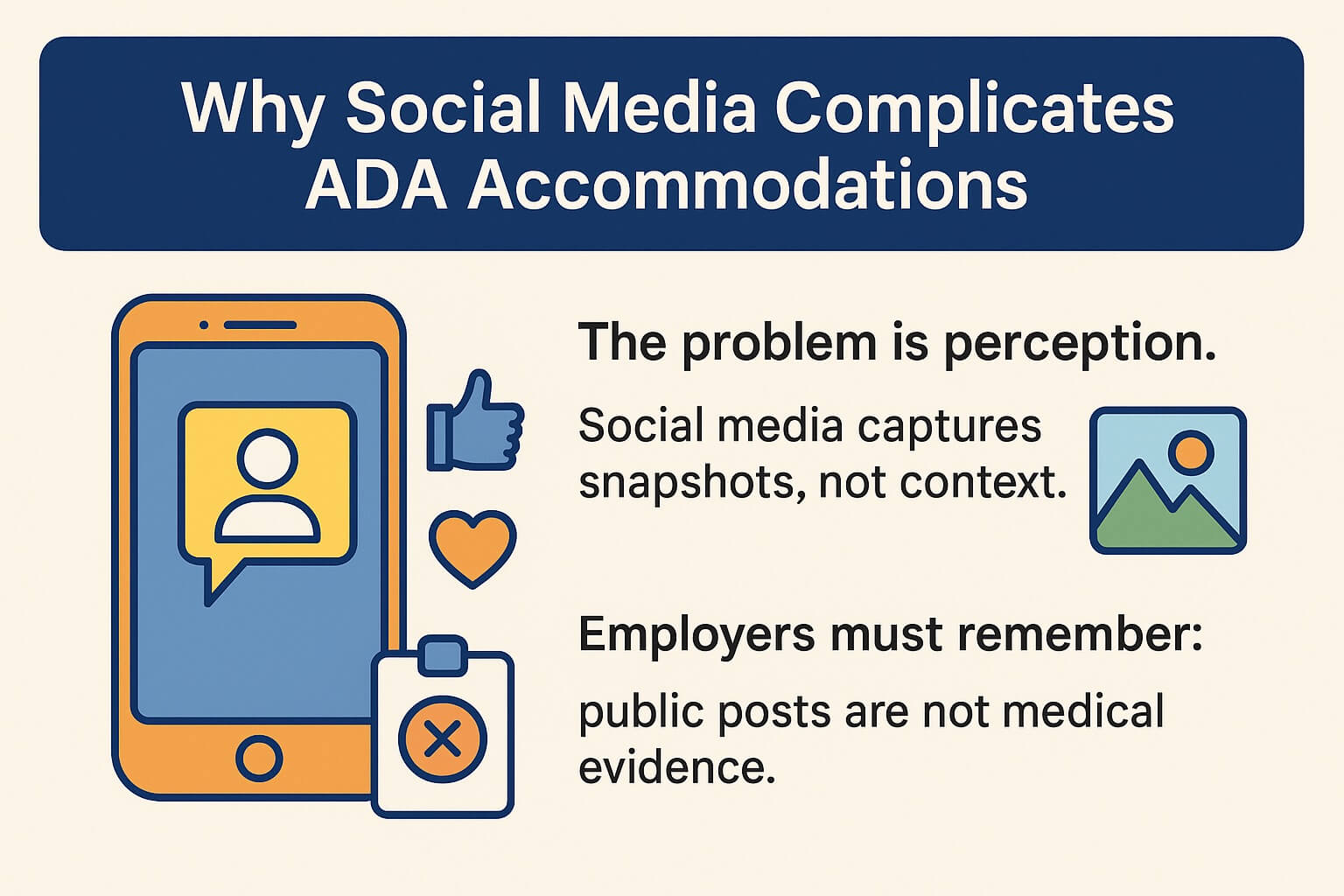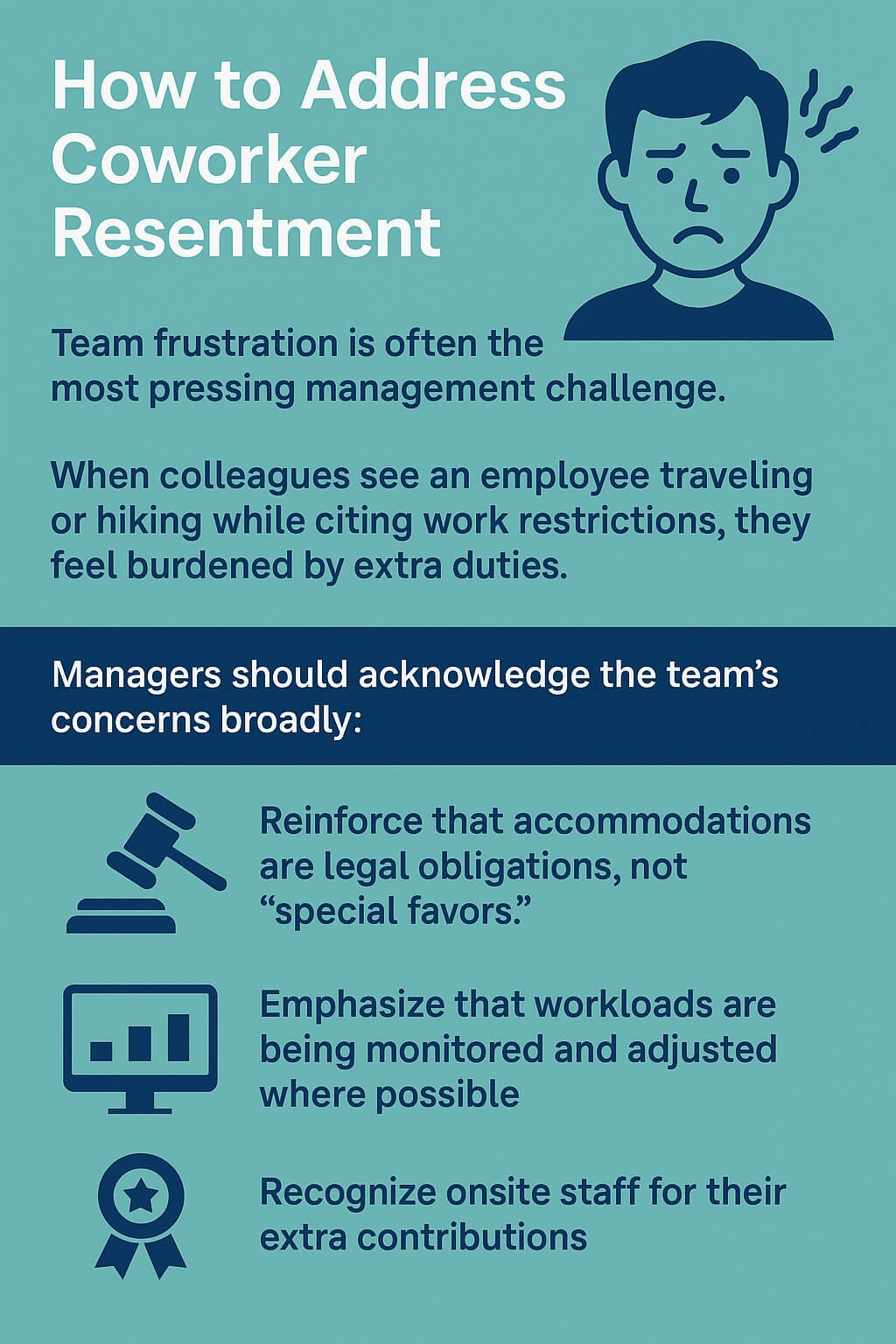TL;DR:
If an employee on an ADA accommodation posts vacation photos that seem inconsistent with their restrictions, don’t jump to conclusions. Social media isn’t medical evidence.
-
Stay compliant: Focus on updated medical documentation when the accommodation expires, not what’s on Instagram.
-
Protect morale: Acknowledge team concerns, redistribute workload fairly, and recognize onsite staff—without sharing private health details.
-
Keep it job-focused: Review whether essential job functions are being met, not how someone spends PTO.
-
Get guidance: Involve HR or legal counsel before making any changes.
The key: Separate perception from process—protect ADA rights while addressing fairness.
The Americans with Disabilities Act (ADA) requires employers to provide reasonable accommodations so employees with qualifying disabilities can perform essential job functions. Remote work accommodations are one of the most common requests since the pandemic. But what happens when an employee posts vacation photos online that seem inconsistent with their stated limitations?
For example, consider an employee who cannot commute or sit for long periods in the office but shares social media updates from a hiking trip in Mexico. When coworkers see these posts, morale drops, complaints surface, and resentment brews. This puts the manager in a difficult position: protect workplace fairness or risk crossing ADA compliance boundaries.
Why Social Media Complicates ADA Accommodations
In the past, employers might never know how an employee spent their personal time. Today, social media makes private activities public, often shared with colleagues. What coworkers see—like long drives or strenuous hikes—may look contradictory to the employee’s medical restrictions.

The problem is perception. Social media captures snapshots, not context. An employee who can’t sustain an eight-hour commute might still manage a hike with frequent breaks, or drive long distances with flexibility they wouldn’t have in a workday. Employers must remember: public posts are not medical evidence.
The Risk of Reacting to Perception
It can be tempting to confront an employee directly about their vacation activities. But that approach is legally dangerous. The ADA prohibits retaliation and discrimination. Suggesting that someone’s disability is invalid because of vacation photos could be construed as questioning the legitimacy of their condition itself.
Courts generally expect employers to rely on formal medical documentation, not personal observations or social media posts, when evaluating accommodations. Jumping to conclusions exposes the company to claims of bias.
How to Address Coworker Resentment
Team frustration is often the most pressing management challenge. When colleagues see an employee traveling or hiking while citing work restrictions, they feel burdened by extra duties. If not addressed, morale issues can spiral into complaints about favoritism or unfairness.
The solution isn’t to explain the specifics of the accommodation—that would violate medical privacy. Instead, managers should acknowledge the team’s concerns broadly:
-
Reinforce that accommodations are legal obligations, not “special favors.”
-
Emphasize that workloads are being monitored and adjusted where possible.
-
Recognize onsite staff for their extra contributions.
This helps maintain trust without disclosing private details.

Using the Interactive Process to Stay Compliant
Rather than focusing on what the employee did on vacation, managers should return to the interactive process required by the ADA.
If the accommodation has an expiration date (e.g., three months left), it’s appropriate to request updated medical certification when the time comes. At that point, the employer can:
-
Ask for clarification on the employee’s current restrictions.
-
Review whether essential job functions are being met.
-
Explore alternative accommodations if remote work is no longer appropriate.
This keeps the discussion rooted in compliance and documentation, not perception.
Balancing Essential Job Functions
The ADA does not require employers to eliminate essential job functions. If a role genuinely requires in-person presence for certain duties, and the employee cannot perform them even with accommodations, the employer may consider options such as reassignment or extended leave.
Framing the issue around the job—not the vacation—shifts the focus to objective performance. This protects both the business and the employee’s rights.
When Legal and HR Guidance Is Essential
If coworkers’ complaints escalate or if the employer is considering limiting or terminating the accommodation, professional guidance is critical. HR can help ensure consistent policy enforcement, while an employment attorney can advise whether further documentation requests or employment actions are defensible.
In some cases, employers may also use independent medical reviews to verify restrictions. These must be handled carefully and in line with ADA rules.
Key Takeaways
This kind of scenario—an employee approved for remote work under the ADA but posting vacation activities online—is becoming increasingly common. The best response is not to confront or accuse but to separate perception from process:
-
Social media posts are not proof of abuse.
-
Team morale issues must be addressed through recognition and fairness, not disclosure of private health information.
-
Employers should revisit accommodations only through the interactive process and updated medical documentation.
-
Essential job functions remain the standard against which performance must be measured.
Handled carefully, employers can protect ADA compliance, manage fairness concerns, and preserve team trust—without exposing themselves to costly legal risk.
